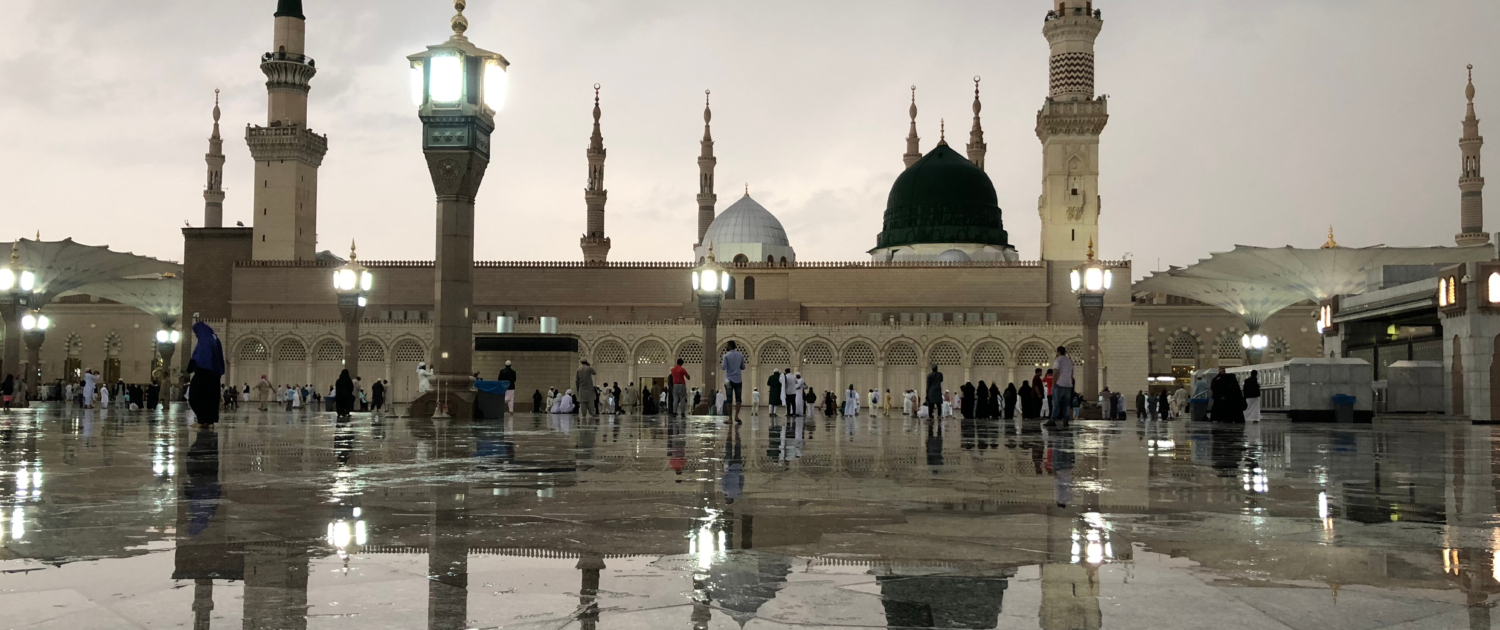The Prophet’s Smile – “Around Us But Not on Top of Us”
The Prophet’s Amusement at Allah’s Mercy
By Shaykh Amin Buxton
In this series, the Prophet’s Smile, we visit the moments where the Prophet smiled and laughed. We also discuss how he was described when smiling and laughing. By studying his characteristics, we gain insight into what he talked and thought about, and ultimately, the undeniable beauty of his character. By knowing more about him, we hope to increase our love and longing for him. We also hope to gain his love and pleasure, which cannot be separated from the love and pleasure of Allah Most High.
In this article, we discuss one particular incident where a bedouin requested for rain. His response to the abundance of rain made the prophet smile.
Anas narrates that a Bedouin man came to the Prophet (peace and blessing be upon him) while he was delivering the Friday sermon in Madinah and complained to him that there was a drought and their livestock was dying and their women and children were hungry. He then beseeched the Prophet to ask for rain. The Prophet raised his hands in supplication. At that point, there was not a cloud in the sky but as soon as he began to supplicate, clouds began to form and pile up like mountains and then it began to rain. Even before he had descended from the pulpit, the Prophet’s beard was dripping with rainwater. It continued to rain that day and the following day and the rain continued until the following Friday.
On that day, the Prophet was once again delivering his sermon on the pulpit when the same man returned (or another man – Anas could not be sure). “O Messenger of Allah,” he said, “our homes are falling apart and our livestock are drowning, so ask your Lord to make it stop!”
The Prophet smiled and raised his hands in supplication saying: “O Allah, around us but not on top of us, around us but not on top of us!” He pointed to the sky and signaled for the clouds to move and they began to clear until there was a circle of clear sky around Madinah while the rain continued to fall upon the areas around the city for another month.
(Narrated by Bukhari and Muslim)
Life was not easy in the early community in Madinah which mostly relied on agriculture and livestock for its sustenance. The drought was a very serious threat to the survival of the people of the city. This Bedouin man came in a state of desperation. He was obviously feeling the effects of the drought hard as he tried to graze his animals in the area around Madinah. He was so desperate that he did not even wait for the Prophet to finish speaking, but interrupted his sermon and complained about the severity of the situation. The Prophet could have told him to sit down and wait but he responded immediately, knowing that the man was speaking not just for himself but for a whole community. Allah says of him: Your suffering distresses him: he is deeply concerned for you (Quran, 9:128).
The Prophet is Allah’s Beloved and when the Beloved asks, the One who loves him so much instantly responds. Within seconds rain started pouring down. Rain is symbolic of Allah’s mercy – when the one who was sent as a mercy to everything asks the All-Merciful for mercy, it duly pours down. In fact, it comes in such abundance day after day that people cannot handle it. And this was perhaps what brought a smile to the Prophet’s lips when the request came to stop the rain. It tells us something about human nature – as Allah says: man was created hasty (Quran, 21:37). We want something very badly and then we get it, we realize we want something else. Blessings can quickly turn into trials. The Prophet’s smile may also have been an expression of his wonder at his Lord’s bounty and generosity.
Here we witness not just one but two miracles, two acts of divine mercy – the immediate sending down of rain and then the immediate removal of that rain. It is noticeable that the Prophet did not ask for the rain to stop completely, but instead, he asked for it to be removed from the city of Madinah itself where the damage was being felt. He asked for the harm to be removed but the benefit to continue and this is what happened: the valleys around Madinah continued to receive plentiful rainfall for a month. There is a lesson in this that if we receive a blessing but it then becomes difficult, we should not ask for it to stop coming but we should ask for whatever detracts from that blessing to be removed. The scholars also teach us when we ask for something to ask for it accompanied with gentleness and wellbeing (lutf and afiyah).
We see time and time again that when the Companions were in difficulty or had needs great or small they would go to the Messenger. The Bedouin man could have asked Allah directly for rain but he knew that the Prophet was infinitely closer to Allah and his prayers would be answered. They understood the concept of an intermediary. They knew the status of the Prophet in Allah’s sight and they knew the Prophet was happy to play the role of an intermediary. And he did so with a smile.
May Allah give our beloved Prophet the highest of rewards on our behalf.
